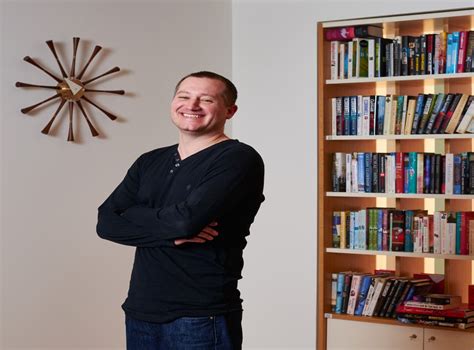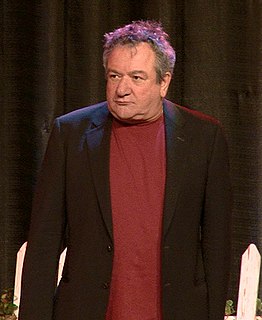A Quote by Karen Joy Fowler
If I'm made to pick one transcendent reading experience, then it was listening to Miss Sarzin as - if we'd been very, very good - she read the next chapter of 'The Hobbit' aloud to us.
Related Quotes
One of the things I miss most is that I can no longer read, due to age-related macular degeneration. I get regular injections for this, and thankfully these seem to have arrested its progress, but it's still very difficult for me to read. That means it is hard for me to pick up my Bible and read it like I used to, and I miss that very much.
I'm very pessimistic about adaptations from one medium to another. I've got a very kind of primitive, Puritan view of it. I tend to think that if something was derived for one medium, then there's no real immediate reason to think that it's necessarily going to be as good or better if adapted into another one. There have been very good stage plays that have made some very good films. But there are not so many differences between the theater and the cinema as there are between the cinema and, say, reading a book or reading a comic.
Forever, reading has been central, the necessary fix, the support system. Her life has been informed by reading. She has read not just for distraction, sustenance, to pass the time, but she has read in a state of primal innocence, reading for enlightenment, for instruction, even. ... She is as much a product of what she has read as of the way in which she has lived; she is like millions of others built by books, for whom books are an essential foodstuff, who could starve without.
A lot of actors choose parts by the scripts, but I don't trust reading the scripts that much. I try to get some friends together and read a script aloud. Sometimes I read scripts and record them and play them back to see if there's a movie. It's very evocative; it's like a first cut because you hear 'She walked to the door,' and you visualize all these things. 'She opens the door' . . . because you read the stage directions, too.
We have an obligation to read aloud to our children. To read them things they enjoy. To read to them stories we are already tired of. To do the voices, to make it interesting, and not to stop reading to them just because they learn to read to themselves. Use reading-aloud time as bonding time, as time when no phones are being checked, when the distractions of the world are put aside.
If we are always reading aloud something that is more difficult than children can read themselves then when they come to that book later, or books like that, they will be able to read them - which is why even a fifth grade teacher, even a tenth grade teacher, should still be reading to children aloud. There is always something that is too intractable for kids to read on their own.
I suppose she chose me because she knew my name; as I read the alphabet a faint line appeared between her eyebrows, and after making me read most of My First Reader and the stock-market quotations from The Mobile Register aloud, she discovered that I was literate and looked at me with more than faint distaste. Miss Caroline told me to tell my father not to teach me any more, it would interfere with my reading.
Unlike most readers in Antiquity who read their books aloud, we have developed the convention of reading silently. This lets us read more widely but often less well, especially when what we are reading-such as the plays of Shakespeare and Holy Scripture-is a body of oral material that has been, almost but not quite accidentally, captured in a book like a fly in amber.


































